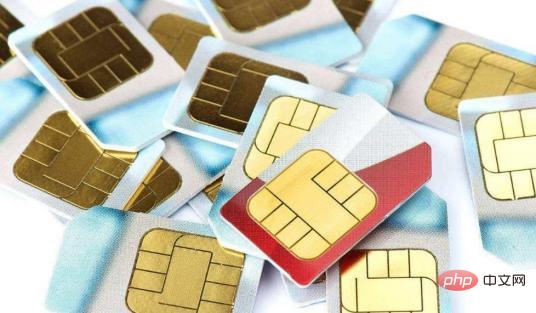
China Mobile Number Card refers to the SIM card of China Mobile, also known as user identification card and smart card. It is an IC card held by mobile users of the GSM system; GSM digital mobile phones must be equipped with this card. The card can be used. The GSM system identifies GSM users through the SIM card. GSM mobile phones can only be used on the network after inserting the SIM card.

The operating environment of this tutorial: Windows 10 system, Dell G3 computer.
The China Mobile number card is usually the SIM card of China Mobile. It is usually given as a gift with the product, and you don’t need to open a card.
SIM (Subscriber Identity Module) card is an IC card held by mobile users of the GSM system, called a subscriber identification card. The GSM system identifies GSM users through SIM cards. The same SIM card can be used on different mobile phones. GSM mobile phones can only be used online after inserting a SIM card.

The SIM card is the key for GSM mobile phones to connect to the GSM network. Once the SIM card is pulled out from the mobile phone, except for emergency calls, the mobile phone will not be able to enjoy various services provided by the network operator. kind of service. In addition to being used as keys, SIM cards also provide users with a lot of convenience. Users only need to insert or embed the SIM card into any GSM terminal to achieve communication. The SIM card also manages a lot of information provided to the user's services and can be used to store short messages, especially those received when the user does not turn on the phone or is away.
SIM card is a subscriber identification card for digital cellular mobile phones. Its full name is "Subscriber Identification Module". In the GSM digital mobile phone system, the SIM card plays an extremely important role. It is not only an important part of the mobile phone, but also an identity card for every GSM mobile phone user. Therefore, the SIM card realizes the identification of people. The concept of machine[3].
Main content
The SIM card is a "smart" card that complies with GSM specifications. It contains information related to the user and stored on the user's side. Information, including:
1, International Mobile Subscriber Identity Number (IMSl). Simply put it is the user's phone number. IMSI is a globally uniformly coded number that uniquely identifies a user. It uses the network to identify which country and telecommunications operating department the user belongs to. Even which mobile service area it belongs to.
2. User’s key and confidentiality algorithm. The user key and confidentiality algorithm can not only identify the user's identity and prevent illegal entry into the network, but also prevent the user data transmitted on the wireless channel from being stolen, thus eliminating the phenomenon of "simultaneous account theft".
3. Personal password (PIN code) and SIM card unlocking password (PUK code). The PIN code is the personal password of the SIM card. It can prevent others from using the SIM card without authorization. When the PIN code is pressed incorrectly, the PUK code is required to unlock it.
4. Storage space used by users. Users can store some fixed short messages, directory and other personal information in the SIM card.
The main functions of the SIM card
The SIM card mainly completes two functions: storing data (controlling access to various data) and under safe conditions (personal identity The number PIN and authentication key Ki are correct) to complete the entire process of customer identity authentication and customer information encryption algorithm.
This function is mainly completed by a microprocessor with an operating system in the SIM card. The chip has eight contacts, and the interconnection with the mobile station equipment is completed after the card is inserted into the equipment and powered on. At this point, the operating system and command settings can provide intelligent features for the SIM.
The logical structure of SIM card intelligent features is a tree structure. All characteristic parameter information is expressed in data fields. That is, there are three application directories under the root directory, one belonging to the administrative department application directory, and two application directories belonging to technical management, namely the GSM application directory and the telecommunications application directory. All directories contain data fields, including binary and formatted data fields. Some of the information in the data fields is permanent and cannot be updated, and some is temporary and needs to be updated. Each data field must express its purpose, update level, characteristics of the data field (such as identifier), whether the type is binary or formatted, etc.
In addition to storing normal data fields, the SIM card also stores non-file fields such as authentication keys, personal identity authentication numbers, personal unlock codes and other data.
The SIM card is developing its phased functions with the implementation of the GSM phase. Usually the functions suggested in the second stage are built on the basis of the first stage, so the SM cards in the second stage are also suitable for the first stage.
SIM card structure
SIM card is a smart card containing a microprocessor. It consists of CPU (8 bits), RAM (working memory, 6~16kB), It consists of 5 parts: ROM (program memory, 3~8 kB), EPROM or EEPROM (data memory, 128~256 kB) and serial communication unit. These 5 modules are integrated into an integrated circuit to prevent illegal access. and theft, because the connection between the chips may become an important clue to illegal access and theft of the SIM card.
When the SIM card is connected to the mobile phone, at least 5 connections are required, as shown in Figure 1. In the figure, Vcc is the power supply, CLK is the clock, Reset is reset, N.C is unused, Gnd is the ground terminal, I/O is the data input and output interface, and Vpp is the programming voltage. Whenever the phone is turned on, the mobile phone must communicate with the SIM card. Some data signals can be measured on the SIM card holder with an oscilloscope.
Types of SIM cards
There are two types of SIM cards in actual use that have the same function but different shapes:
①Embedded SIM card ( Commonly known as small card): This card is only 25mm × 15mm in size (smaller than ordinary stamps) and is semi-permanently installed in GSM mobile phones. It is currently the most popular SIM card. If you want to change a small SIM card into a large SIM card, you only need to buy a SIM card holder, and the small SIM card can be used as a large SIM card.
②Card-type SIM card (commonly known as blockbuster): The size of this card is 54mm×84mm (about the size of a business card). The big card complies with the ISO7816 standard for IC cards and is similar to an IC card. Users can use the card by inserting it into their mobile device.
For more related knowledge, please visit the FAQ column!
The above is the detailed content of What is the China Mobile Number Card?. For more information, please follow other related articles on the PHP Chinese website!